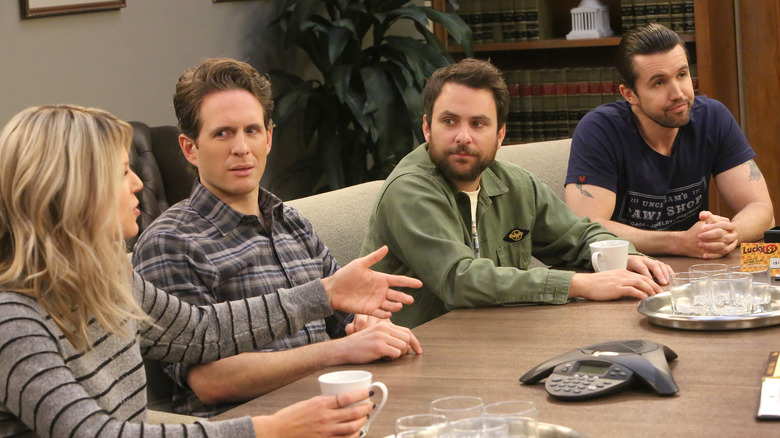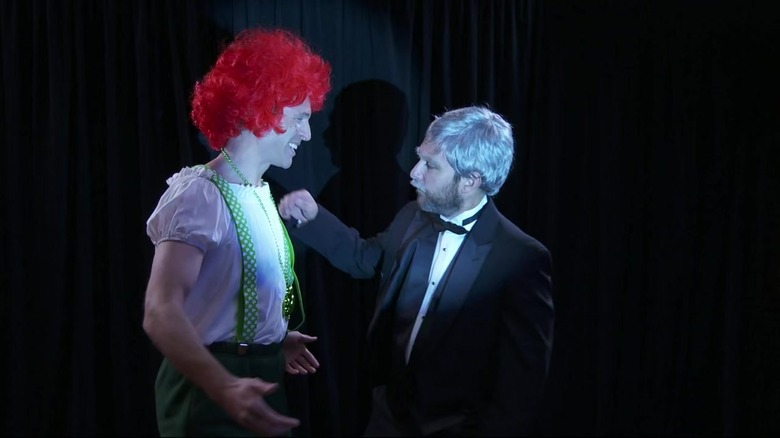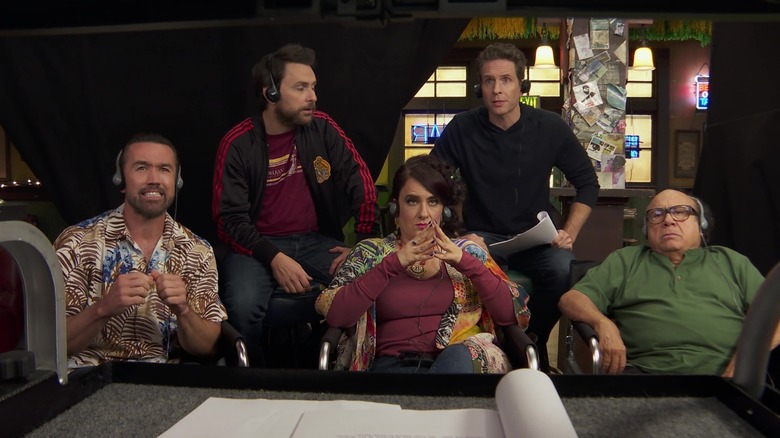Five Episodes Of It's Always Sunny In Philadelphia You Won't Find On All Streaming Services
"It's Always Sunny in Philadelphia" has always pushed boundaries with its dark comedy. I mean, the very first episode is entitled "The Gang Gets Racist," so it's not exactly a beacon of political correctness. The ridiculously popular series has always been self-aware of its potentially offensive material and has remained heavily critical of the characters' negligible choices from the very beginning. Still, the streaming services hosting the show made the controversial choice to take down some of the more troubling episodes featuring questionable attempts at humor.
So, which five episodes got removed, and why?
In the wake of the string of Black Lives Matter uprisings in 2020, several episodes of the long-running sitcom were removed from Hulu and other streaming platforms. These episodes included every appearance of Dee's racist caricature Martina Martinez, who she depicts in brownface with a butchered Latine accent. Martina first appears in the season 4 episode "America's Next Top Paddy's Billboard Model Contest" and later returns in the second episode of season 8, entitled "The Gang Recycles Their Trash." The 2019 episode "Dee Day" sees yet another revival of the character by Frank, as well as an Asian caricature from Dee's repertoire portrayed by Mac.
The show's other characters were always highly critical of Dee's racist caricatures, especially by the time season 15 rolled around and cultural tides had begun to shift. Her brother Dennis was outspokenly opposed to Martina from the beginning. The rest of the gang doesn't have much moral high ground, but even they understand how wrong it is to wear brownface — mostly.
That brings us to the "Lethal Weapon" of it all.
The gang's Lethal Weapon saga was removed from Hulu
The gang created their own additions to the "Lethal Weapon" franchise several times over the course of its decades-long run. Their homemade fifth and sixth entries to the film series feature Mac in blackface, reviving the starring role originally played by Danny Glover. Frank also makes an appearance in redface depicting a racist Native American villain. The gang has a heated debate about the ethics of Mac's blackface while making their first "Lethal Weapon" in the season 6 episode "Dee Reynolds: Shaping America's Youth." He and Dee both don blackface for the second installment, "The Gang Makes Lethal Weapon 6." Both episodes were removed from streaming in 2020.
The decision was highly contested by fans on Twitter, as Metro documented at the time. Some fans likened the show's use of blackface to Robert Downey Jr.'s character in "Tropic Thunder," pointing out that it was blatantly a satirical and critical depiction of the practice. A Change.org petition to reinstate the banned episodes earned nearly five thousand signatures. Others felt that any use of blackface, even a self-aware one, was objectively offensive.
While the series creators haven't spoken out against these comments, they haven't spoken in direct support of taking these episodes down, either. But the creative minds behind the series are less concerned with revising its history and more focused on keeping the hit show fresh and moving forward.
The show addresses its censorship head on
Rob McElhenney is an executive producer, writer, director, and co-creator of "It's Always Sunny" that also stars in the series as Mac — meaning that he was responsible for several of the instances of blackface and yellowface on the show. The show decided to revisit the "Lethal Weapon" saga in the wake of the controversy with the season 15 episode "The Gang Makes Lethal Weapon 7," a meta-commentary on the series' censorship. When their local library removes the gang's racist home movies for insensitivity, Frank reacts in outrage, but Mac and the rest of the gang adopt white savior buzzwords and pat themselves on the back for "growing."
Both the characters and the series creators underwent a bit of racial reform in this episode. Their seventh "Lethal Weapon" entry features Black actors instead of blackface. Behind the scenes, the episode had a Black co-writer, Keyonna Taylor, and a Black director, Pete Chatmon.
"At its foundation, it's a show about five ignorant, white people, right?" McElhenney explained this decision to The New York Times. "So, at first we thought, well, how does it even make sense to have different points of view in there? Then we were like, 'Oh my God, of course. Who could better understand how it feels to be in the wake of ignorant white people than people who aren't ignorant white people?' Ignorant white men, specifically."
So, was "It's Always Sunny" right to censor their old episodes, or is this a revision of the show's long-running history? The show manages to roast both sides of the aisle in "Lethal Weapon 7," critiquing the anti-PC brigade and the white liberal superiority complex. Not a lot of shows can come back from blackface, but the series has struck a perfect balance in its nearly two decades on air, which is why they continue to evade the so-called cancel culture.


